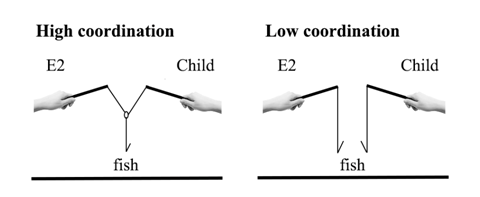Recently, an article titled“How you act matters: The impact of coordination on 4-year-old children’s reasoning about diverse desires”, has been accepted by Journal of Experimental Child Psychology, a top academic journal in child development (impact factor: 2.424, SSCI),from Dr. Shen and Dr. He’s team.
Cooperation is generally found to have a more positive impact than competition on children’s high-level social understanding (e.g., diverse desires and false beliefs); however, recent evidence has shown that competition could also improve such understanding. Differences in coordination level during interactions with others may potentially explain these inconsistent results. In this study, we tested the impact of coordination on children’s ability to reason about diverse desires in both competitive and cooperative conditions. Four-year-old children played a competitive (Experiment 1, N = 48) or cooperative (Experiment 2, N = 48) game with an adult. They were then tested for their understanding of diverse desires in a gift selection condition, which was difficult for children of this age. Coordination levels were manipulated as high versus low in both games. Results showed that coordination enhanced their performance in reasoning about diverse desires, allowing them to conduct desire inferences and perspective taking simultaneously in both conditions.

In addition, Dr. He and her colleagues focus on the effect of social interaction on children’s understanding of others. They found that cooperation, but not competition, improves 4-year-olds’ reasoning about others’ minds. This finding accords well with the constructivist view that social understanding could be shaped by the underlying structure of the social interaction one participates in. More importantly, it adds to our knowledge about how social interaction enhances one’s social understanding at an early age; specifically, it highlights the decisive role of coordination in this process.
Jin, X., Li, P., He, J.*, &Shen, M.* (2017). Cooperation, but not competition, improves four-year-old children’s reasoning about conflicting desires. Journal of Experimental and Child Psychology, 157, 81-94.
Jin, X., Li, P., He, J.*, &Shen, M.* (2017). Cooperation, but not competition, improves four-year-old children’s reasoning about conflicting desires. Journal of Experimental and Child Psychology, 157, 81-94.



